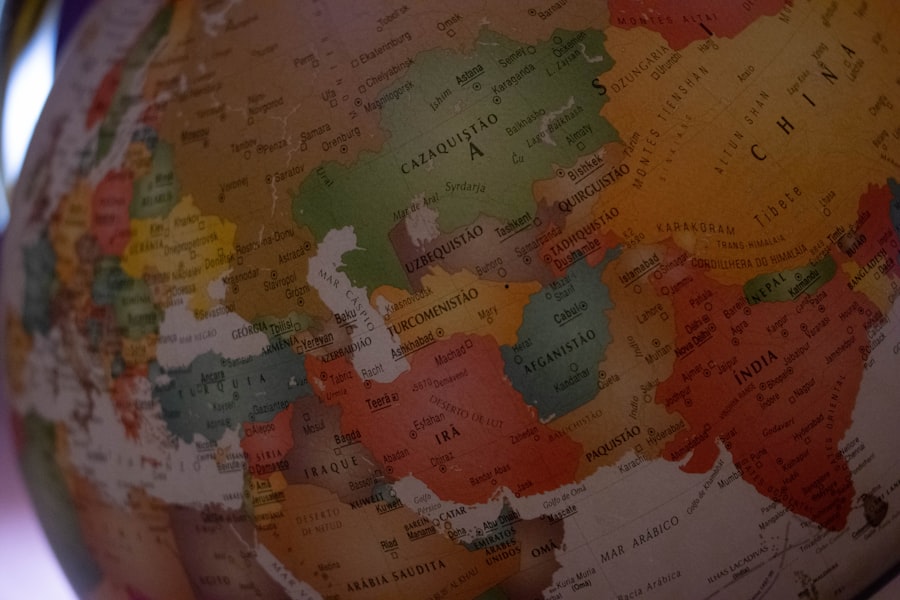Geopolitical risks encompass a broad spectrum of uncertainties that arise from the interplay of geography, politics, and international relations. These risks can manifest in various forms, including military conflicts, trade disputes, and diplomatic tensions. They are influenced by factors such as national interests, cultural differences, and historical grievances.
As nations navigate their relationships with one another, the potential for conflict or cooperation can significantly impact global stability and economic conditions. Understanding these risks is crucial for businesses, investors, and policymakers alike, as they can have far-reaching consequences on a global scale. The complexity of geopolitical risks lies in their dynamic nature.
They are not static; rather, they evolve in response to changing political landscapes, economic conditions, and social movements. For instance, the rise of populism in various countries has led to a reevaluation of international alliances and trade agreements. Additionally, technological advancements have altered the way nations interact, with cyber warfare becoming a new frontier in geopolitical conflicts.
As such, a comprehensive understanding of geopolitical risks requires continuous monitoring and analysis of global events and trends.
Key Takeaways
- Geopolitical risks are uncertainties arising from political, economic, social, and environmental factors that can impact global business operations and investment decisions.
- Key geopolitical risks include trade tensions, political instability, terrorism, natural disasters, and cybersecurity threats, among others.
- The impact of geopolitical risks can result in supply chain disruptions, market volatility, increased costs, and reputational damage for businesses.
- Geopolitical risk management strategies involve scenario planning, diversification of operations and investments, and the use of political risk insurance.
- Government policies play a crucial role in managing geopolitical risks through diplomacy, trade agreements, and regulations that promote stability and security.
Identifying Key Geopolitical Risks
Identifying key geopolitical risks involves recognizing the specific factors that can disrupt stability and create uncertainty in international relations. One prominent risk is the resurgence of nationalism, which has led to increased protectionism and a retreat from multilateralism. Countries are increasingly prioritizing their national interests over global cooperation, resulting in trade wars and strained diplomatic ties.
This shift can have significant implications for global supply chains and economic growth, as nations become more insular in their policies. Another critical geopolitical risk is the potential for military conflicts, particularly in regions with longstanding territorial disputes or ethnic tensions. The ongoing tensions in areas such as the South China Sea and Eastern Europe highlight the fragility of peace in these regions.
The possibility of armed conflict not only threatens regional stability but also poses risks to global markets and energy supplies. Furthermore, the proliferation of nuclear weapons and the rise of non-state actors add layers of complexity to the geopolitical landscape, making it essential for stakeholders to remain vigilant in identifying emerging threats.
Assessing the Impact of Geopolitical Risks

The impact of geopolitical risks can be profound and multifaceted, affecting economies, societies, and individual businesses. Economically, geopolitical tensions can lead to market volatility, as investors react to news of conflicts or diplomatic breakdowns. For instance, fluctuations in oil prices often correlate with geopolitical events in oil-producing regions, affecting not only energy markets but also broader economic conditions worldwide.
Additionally, companies operating in politically unstable regions may face disruptions that hinder their operations and profitability. Socially, geopolitical risks can exacerbate existing tensions within countries, leading to civil unrest or mass migrations. For example, conflicts can displace populations, creating humanitarian crises that require international intervention.
The resulting influx of refugees can strain resources in neighboring countries and lead to political backlash against immigrants. Thus, the social ramifications of geopolitical risks extend beyond borders, influencing domestic policies and public sentiment in various nations.
Geopolitical Risk Management Strategies
| Geopolitical Risk Management Strategies | Metrics |
|---|---|
| Country Risk Analysis | Political stability, economic indicators, regulatory environment |
| Diversification | Spreading operations across multiple countries or regions |
| Scenario Planning | Developing strategies for potential geopolitical events |
| Insurance and Hedging | Using insurance and financial instruments to mitigate risk |
| Government Relations | Building relationships with government officials and agencies |
To navigate the complexities of geopolitical risks, organizations must implement effective risk management strategies. One approach is diversification, which involves spreading investments across different regions and sectors to mitigate exposure to any single geopolitical event. By diversifying their portfolios, businesses can reduce the potential impact of localized disruptions on their overall performance.
Another strategy is scenario planning, which allows organizations to anticipate potential geopolitical developments and prepare contingency plans accordingly. By analyzing various scenarios—such as changes in trade policies or military escalations—companies can develop proactive responses that minimize disruptions to their operations. This forward-thinking approach enables businesses to remain agile in the face of uncertainty and adapt to changing circumstances more effectively.
The Role of Government Policies in Geopolitical Risk Management
Government policies play a crucial role in shaping the landscape of geopolitical risk management. Policymakers must balance national security interests with economic considerations when formulating strategies to address geopolitical challenges. For instance, trade policies can either exacerbate tensions or foster cooperation among nations.
Governments that prioritize diplomacy and multilateral agreements may help mitigate risks by promoting stability and fostering economic interdependence.
By providing guidelines on how to assess and respond to geopolitical risks, policymakers can empower organizations to make informed decisions that align with national interests.
Additionally, collaboration between governments and private sectors can enhance resilience against geopolitical threats, as both entities work together to identify vulnerabilities and develop comprehensive strategies.
Geopolitical Risk and Global Business Operations

Global business operations are inherently intertwined with geopolitical risks, as companies often operate across multiple jurisdictions with varying political climates. The ability to navigate these complexities is essential for maintaining competitiveness in an increasingly interconnected world. Businesses must stay informed about the political landscape in the regions where they operate, as changes in government policies or social unrest can directly impact their operations.
Furthermore, companies must consider the implications of geopolitical risks on their supply chains. Disruptions caused by political instability or trade disputes can lead to delays in production and increased costs. As a result, organizations are increasingly adopting strategies such as nearshoring or reshoring to mitigate these risks by relocating production closer to home markets or diversifying suppliers across different regions.
Geopolitical Risk and Investment Decisions
Investment decisions are heavily influenced by geopolitical risks, as investors seek to minimize exposure to potential losses stemming from political instability or conflict. Understanding the geopolitical landscape is essential for making informed investment choices that align with risk tolerance levels.
Moreover, geopolitical risks can create both challenges and opportunities for investors. While instability may deter investment in certain regions, it can also present opportunities for those willing to take calculated risks. For instance, emerging markets may offer high growth potential despite political uncertainties.
Investors who conduct thorough due diligence and remain adaptable can capitalize on these opportunities while managing associated risks effectively.
Geopolitical Risk and Supply Chain Management
Supply chain management is increasingly affected by geopolitical risks as companies strive to maintain efficiency while navigating complex international landscapes. Disruptions caused by political tensions or trade disputes can lead to delays in sourcing materials or delivering products to consumers. As a result, organizations must develop robust supply chain strategies that account for potential geopolitical disruptions.
One effective approach is building resilience into supply chains through diversification of suppliers and logistics partners. By sourcing materials from multiple regions or establishing alternative transportation routes, companies can reduce their vulnerability to localized disruptions. Additionally, investing in technology such as real-time monitoring systems can enhance visibility across supply chains, enabling organizations to respond swiftly to emerging geopolitical threats.
Geopolitical Risk and Cybersecurity
In today’s digital age, cybersecurity has become an integral component of managing geopolitical risks. As nations increasingly rely on technology for communication and infrastructure, the potential for cyberattacks has grown significantly. Geopolitical tensions often manifest in cyberspace, with state-sponsored actors targeting critical infrastructure or sensitive data as a means of exerting influence or causing disruption.
Organizations must prioritize cybersecurity measures to protect against these evolving threats. This includes implementing robust security protocols, conducting regular assessments of vulnerabilities, and fostering a culture of cybersecurity awareness among employees. By proactively addressing cybersecurity risks within the context of geopolitical tensions, businesses can safeguard their operations and maintain trust with stakeholders.
Geopolitical Risk and International Relations
Geopolitical risks are deeply intertwined with international relations, as they shape the dynamics between nations and influence global cooperation efforts. Diplomatic relations often hinge on perceptions of security and stability; thus, understanding the underlying factors driving geopolitical tensions is essential for fostering constructive dialogue among nations. Moreover, international organizations play a vital role in mitigating geopolitical risks by facilitating communication and collaboration among member states.
Institutions such as the United Nations or regional alliances provide platforms for dialogue that can help de-escalate tensions and promote peaceful resolutions to conflicts. By engaging in multilateral diplomacy, nations can work together to address shared challenges and build a more stable global environment.
Geopolitical Risk and Future Trends
As the world continues to evolve, so too will the landscape of geopolitical risks. Emerging trends such as climate change, technological advancements, and shifting power dynamics will shape the future of international relations and influence how nations interact with one another. Climate change poses significant challenges that could exacerbate existing tensions over resources such as water and arable land.
Additionally, advancements in technology will continue to alter the nature of warfare and diplomacy. The rise of artificial intelligence and cyber capabilities will create new avenues for conflict while also offering tools for enhanced cooperation among nations. As stakeholders navigate this complex landscape, understanding future trends will be essential for developing effective strategies to manage geopolitical risks.
In conclusion, navigating the intricate web of geopolitical risks requires a multifaceted approach that encompasses understanding key factors at play, assessing impacts on various sectors, implementing effective management strategies, and fostering collaboration among governments and businesses alike. As the global landscape continues to evolve, staying informed about emerging trends will be crucial for mitigating risks and seizing opportunities in an increasingly interconnected world.
In the ever-evolving landscape of international relations, understanding and assessing geopolitical risks is crucial for businesses and governments alike. A related article that delves into the intricacies of Geopolitical Risk Assessment can be found on MyGeoQuest. This resource provides valuable insights into how geopolitical dynamics can impact global markets and strategic decision-making. For a deeper exploration of these themes, you can read more about it on their sample page. This article offers a comprehensive overview of the methodologies used in evaluating geopolitical risks and their implications for various sectors.
WATCH NOW! Unlocking Disaster: 7 Choke Points That Could Fracture Our Connected World Overnight
FAQs
What is Geopolitical Risk Assessment?
Geopolitical risk assessment is the process of evaluating the potential impact of political, economic, and social factors on a specific region or country. It involves analyzing the stability of governments, the likelihood of conflict, and the potential for economic disruption.
Why is Geopolitical Risk Assessment Important?
Geopolitical risk assessment is important for businesses, investors, and governments to understand the potential risks and opportunities in different regions. It helps in making informed decisions about investments, trade, and international relations.
What are the Key Factors Considered in Geopolitical Risk Assessment?
Key factors considered in geopolitical risk assessment include political stability, economic conditions, social unrest, security threats, regulatory environment, and international relations. These factors can have a significant impact on business operations and investment decisions.
How is Geopolitical Risk Assessment Conducted?
Geopolitical risk assessment is conducted through a combination of research, analysis, and expert opinions. It involves gathering data on political and economic indicators, assessing potential risks, and developing strategies to mitigate those risks.
What are the Tools and Methods Used in Geopolitical Risk Assessment?
Tools and methods used in geopolitical risk assessment include scenario planning, risk mapping, country risk ratings, and geopolitical intelligence reports. These tools help in identifying potential risks and developing risk management strategies.
Who Uses Geopolitical Risk Assessment?
Geopolitical risk assessment is used by multinational corporations, financial institutions, government agencies, and international organizations. It is also utilized by risk management professionals, political analysts, and security experts to understand and mitigate potential risks.
